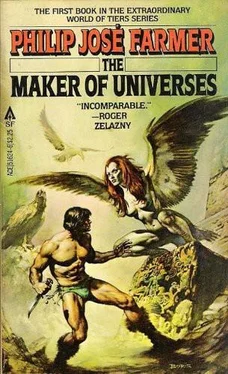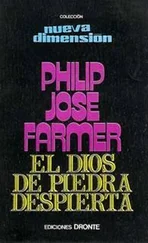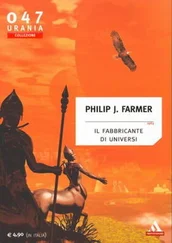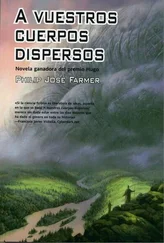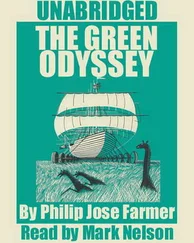After his capture in the Garden, Kickaha was taken across Okeanos to the base of the monolith. While they were climbing up it, a raven Eye stopped them. He had carried the news of Kickaha’s capture to the Lord, who sent him back with orders. The gworl were to split into two bands. One was to continue with Kickaha. The other was to return to the Garden rim. If the man who now had the horn were to return through the gate with it, he was to be captured. The horn would be brought back to the Lord.
Kickaha said, “I imagine Arwoor wanted you brought back, too. He probably forgot to relay such an order to the gworl through the raven. Or else he assumed you’d be taken to him, forgetting that the gworl are very literal-minded and unimaginative.
“I don’t know why the gworl captured Chryseis. Perhaps they intend to use her as a peace-offering to the Lord. The gworl know he is displeased with them because I’ve led them such a long and sometimes merry chase. They may mean to placate him with the former Lord’s most beautiful masterpiece.”
Wolff said, “Then the present Lord can’t travel between tiers via the resonance points?”
“Not without the horn. And I’ll bet he’s in a hot-and-cold running sweat right now. There’s nothing to prevent the gworl from using the horn to go to another universe and present it to another Lord. Nothing except their ignorance of where the resonance points are. If they should find one… However, they didn’t use it by the boulder, so I imagine they won’t try it elsewhere. They’re vicious but not bright.”
Wolff said, “If the Lords are such masters of super-science, why doesn’t Arwoor use aircraft to travel?”
Kickaha laughed for a long time. Then he said, “That’s the joker. The Lords are heirs to a science and power far surpassing Earth’s. But the scientists and technicians of their people are dead. The ones now living know how to operate their devices, but they are incapable of explaining the principles behind them or of repairing them.
“The millenia-long power struggle killed off all but a few. These few, despite their vast powers, are ignoramuses. They’re sybarites, megalomaniacs, paranoiacs, you name it. Anything but scientists.
“It’s possible that Arwoor may be a dispossessed Lord. He had to run for his life, and it was only because Jadawin was gone for some reason from this world that Arwoor was able to gain possession of it. He came empty-handed into the palace; he has no access to any powers except those in the palace, many of which he may not know how to control. He’s one up in this Lordly game of muscial universes, but he’s still handicapped.”
Kickaha fell asleep. Wolff stared into the night, for he was on first watch. He did not find the story incredible, but he did think that there were holes in it. Kickaha had much more explaining to do. Then there was Chryseis. He thought of an achingly beautiful face with delicate bone structure and great catpupiled eyes. Where was Chryseis, how was she faring, and would he ever see her again?
During Wolff’s second watch, something black and long and swift slipped through the moonlight between two bushes. Wolff sent an arrow into the predator, which gave a whistling scream and reared up on its hind legs, towering twice as high as a horse. Wolff fitted another arrow to the string and fired it into the white belly. Still the animal did not die, but went whistling and crashing away through the brush.
By then Kickaha, knife in hand, was beside him. “You were lucky,” he said. “You don’t always see them, and then, pffft! They go for the throat.”
“I could have used an elephant gun,” Wolff said, “and I’m not sure that would have stopped it. By the way, why don’t the gworl—or the Indians, from what you’ve told me—use firearms?”
“It’s strictly forbidden by the Lord. You see, the Lord doesn’t like some things. He wants to keep his people at a certain population level, at a certain technological level, and within certain social structures. The Lord runs a tight planet.
“For instance, he likes cleanliness. You may have noticed that the folk of Okeanos are a lazy, happy-go-lucky lot. Yet they always clean up their messes. No litter anywhere. The same goes on this level, on every level. The Amerindians are also personally clean, and so are the Drachelanders and Atlanteans. The Lord wants it that way, and the penalty for disobedience is death.”
“How does he enforce his rules?” Wolff asked.
“Mostly by having implanted them in the mores of the inhabitants. Originally, he had a close contact with the priests and medicine men, and by using religion—with himself as the deity—he formed and hardened the ways of the populace. He liked neatness, disliked firearms or any form of advanced technology. Maybe he was a romantic; I don’t know. But the various societies on this world are mainly conformist and static.”
“So what? Is progress necessarily desirable or a static society undesirable? Personally, though I detest the Lord’s arrogance, his cruelty and lack of humanity, I approve of some of the things he’s done. With some exceptions, I like this world, far prefer it to Earth.”
“You’re a romantic, too!”
“Maybe. This world is real and grim enough, as you already know. But it’s free of grit and grime, of diseases of any kind, of flies and mosquitoes and lice. Youth lasts as long as you live. All in all, it’s not such a bad place to live in. Not for me, anyway.”
Wolff was on the last watch when the sun rounded the corner of the world. The starflies paled, and the sky was green wine. The air passed cool fingers over the two men and washed their lungs with invigorating currents. They stretched and then went down from the platform to hunt for breakfast. Later, full of roast rabbit and juicy berries, they renewed their journey.
The evening of the third day after, while the sun was a hand’s breadth from slipping around the monolith, they were out on the plain. Ahead of them was a tall hill beyond which, so Kickaha said, was a small woods. One of the high trees there would give them refuge for the night.
Suddenly a party of about forty men rode around the hill. They were dark-skinned and wore their hair in two long braids. Their faces were painted with white and red streaks and black X’s. Their lower arms bore small round shields, and they held lances or bows in their hands. Some wore bear-heads as helmets; others had feathers stuck into caps or wore bonnets with sweeping bird feathers.
Seeing the two men on foot before them, the riders yelled and urged their horses into a gallop. Lances tipped with steel points were leveled. Bows were fitted, with arrows, and heavy steel axes or bladestudded clubs were lifted.
“Stand firm!” Kickaha said. He was grinning. “They are the Hrowakas, the Bear People. My people.”
He stepped forward and lifted his bow above him with both hands. He shouted at the charging men in their own tongue, a speech with many glottalized stops, nasalized vowels, and a swift-rising but slowdescending intonation.
Recognizing him, they shouted, “AngKungawas TreKickaha!” They galloped by, their spears stabbing as closely as possible without touching him, the clubs and axes whistling across his face or above his head, and arrows plunging near his feet or even between them.
Wolff was given the same treatment, which he bore without flinching. Like Kickaha, he showed a smile, but he did not think that it was relaxed.
The Hrowakas wheeled their horses and charged back. This time they pulled their beasts up short, rearing, kicking, and whinnying. Kickaha leaped up and dragged a feather-bonneted youth from his animal. Laughing and panting, the two wrestled on the ground until Kickaha had pinned the Hrowakas. Then Kickaha arose and introduced the loser to Wolff.
Читать дальше
